Photo by N. Chrystine Olson
Ever want to wrangle a rhino? Go to Swaziland and volunteer at the Mkhaya Game Reserve.
In the Mountain Kingdom of Swaziland you’ll find the Mkhaya Game Reserve. It is one of the few places in Africa where you are practically guaranteed to see a rare black rhino in the wild.
The park is sanctioned by the World Wildlife Fund and, for a very reasonable price, an ecologically minded traveler can assist with the important work of rhino conservation.

 photo by N. Chrystine Olson
photo by N. Chrystine Olson photo by N. Chrystine Olson
photo by N. Chrystine Olson